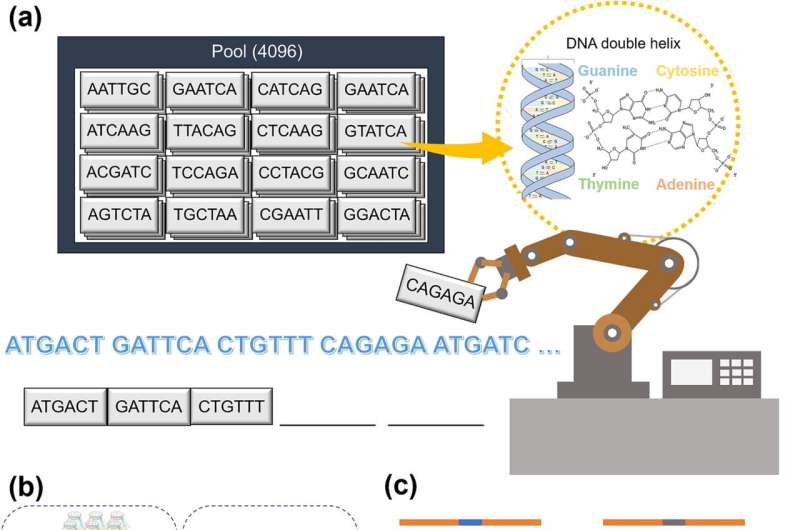
In a study published in Engineering, researchers have developed a revolutionary method for data storage using DNA. The paper titled “Engineering DNA Materials for Sustainable Data Storage Using a DNA Movable-Type System” introduces a novel approach that utilizes DNA fragments, referred to as “DNA movable types,” for data writing, thereby eliminating the need for costly and environmentally hazardous DNA synthesis.
DNA molecules have long been recognized as green materials with immense potential for high-density and long-term data storage. However, the traditional process of DNA data storage via DNA synthesis has been plagued by high costs and the production of hazards, limiting its practical applications. In response to these challenges, the researchers developed a DNA movable-type storage system inspired by ancient movable-type printing.
The key innovation of this system lies in the use of pre-generated DNA fragments, produced by cell factories, as the basic writing units. These DNA movable types are assembled in a repetitive manner to encode digital information, bypassing the need for de novo DNA synthesis. The process of data writing is achieved by the rapid assembly of these DNA movable types, ensuring a reliable and cost-effective approach to data storage.
The researchers successfully encoded 24 bytes of digital information in DNA using this system and accurately read it back through high-throughput sequencing and decoding. This proof-of-concept demonstration showcases the feasibility and potential of the DNA movable-type storage system.
One of the major advantages of this system is its potential for cost reduction. By utilizing pre-synthesized DNA fragments, the need for expensive DNA synthesis is eliminated. Moreover, the assembly-based data-writing process is entirely biological, making it an environmentally friendly and sustainable technique. The researchers also highlight that this process can be easily parallelized, further increasing its efficiency and scalability.
The DNA movable-type storage system presents a promising route towards economical, sustainable, and environmentally friendly data storage solutions. With the ongoing advancement of high-throughput automation solutions, the researchers expect the data write bandwidth of this system to be substantially improved, meeting the future demands of large data storage.
The potential applications of this innovative system are far-reaching. From archival data storage to cloud computing, this technology has the potential to revolutionize the way we store and access information. By harnessing the power of DNA, researchers are paving the way for a more sustainable and efficient digital data-storage technology.
This research opens up new possibilities for the future of data storage and has significant implications for various industries. With its potential for cost reduction, scalability, and sustainability, the DNA movable-type storage system represents a major step forward in the field of data storage.
More information:
Zi-Yi Gong et al, Engineering DNA Materials for Sustainable Data Storage Using a DNA Movable-Type System, Engineering (2023). DOI: 10.1016/j.eng.2022.05.023
Provided by
Engineering
Citation:
Revolutionizing data storage: DNA movable-type system paves the way for sustainable data storage technology (2023, September 21)
retrieved 23 September 2023
from https://techxplore.com/news/2023-09-revolutionizing-storage-dna-movable-type-paves.html
This document is subject to copyright. Apart from any fair dealing for the purpose of private study or research, no
part may be reproduced without the written permission. The content is provided for information purposes only.
For all the latest Technology News Click Here
For the latest news and updates, follow us on Google News.

